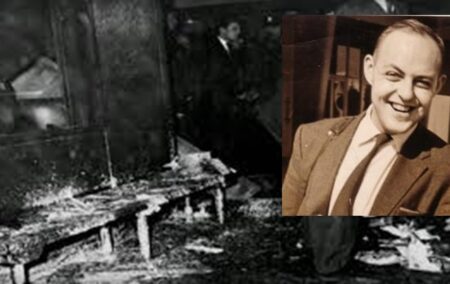Remembering a testing moral challenge that remains vivid this half century later.
The blast of a dynamite-and-petrol bomb on the main concourse of the Johannesburg railway station 55 years ago today – injuring 23 adults and children, including a young girl who was left permanently disfigured, and her elderly granny, who died less than four weeks later – presented the liberal cause in South Africa with a testing moral challenge that remains vivid today.
At the heart of the story of John Harris, the man who set the bomb and hid it in the suitcase he left on the station platform shortly after 4pm on 24 July 1964 with a note saying ‘Back in 10 minutes’, is a simple question: is there ever any justification for maiming or claiming the life of an incidental stranger – the ‘innocent bystander’ of the customary idiom – in the service of a virtuous ideal?
Of course, in the Harris story, as in many others of its kind, it was not quite as simple as that. Frederick John Harris, a senior member of the Liberal Party (which stood for a democratic non-racial South Africa with ‘one-man, one-vote’ as its franchise policy) and one of the umpteen liberal members of the African Resistance Movement (ARM) set up to weaken apartheid by sabotage, did not mean to hurt or cause the death of anyone.
After leaving his explosive device on the platform, he made three telephone calls between 4.15pm and 4.27pm – to the Rand Daily Mail and Die Transvaler newspapers, and to the Railway Police, whom he urged to clear the concourse – warning that a suitcase containing a bomb was primed to go off at 4.33pm.
His idea, the record suggests, was in line with ARM’s commitment to targeting things (such as electricity pylons), not people. He appeared to be motivated rather by the idea that a spectacular blast on the newly modernised concourse of the country’s main railway station would send a shock wave through white South Africa sufficient perhaps to bring supporters of the apartheid system to their senses, or, at least, nudge white South Africa towards thinking more seriously about the rights and fate of their black fellow citizens.
But, for whatever reason – and it has never been explained – the concourse was not cleared. Instead, tragedy.
Even after all these years, it is morally and emotionally taxing to the read of the little family group – Ethel Rhys, in her seventies, her daughter Ethel Burleigh, and granddaughters Carol, 13, and Glynnis, 12 – converging with their moment of terror. Glynnis, disfigured for life, and her grandmother, who would soon die, were closest to the blast.
For some, the quick arrest of Harris, his subsequent conviction for murder, and his death by hanging on 1 April 1965, was and doubtless remains a fitting consequence, a just reckoning.
For a greater number, Harris was a hero, the ‘good terrorist’ of the title of a documentary made not many years ago – and the only white person to number among the 134 South Africans hanged for acts committed in resisting apartheid. He is honoured, today, at Freedom Park.
But, for liberals, the story of John Harris is discomforting, for the test is neither the virtue of the greater objective nor the balancing of unfortunate costs against fortunate outcomes.
It is the primacy of the person as the fundamental constituent of society that has to matter more, always. Where humans depart from this fundamental precept, virtue suffers irrecoverable contamination.
This is the niggling anxiety that wells up in C J ‘Jonty’ Driver’s slim volume, The Man with the Suitcase, perhaps the most thoughtful and provocative account of John Harris, his bomb, his life and his death, and the consequences for everyone involved.
I re-read it this week.
Near the end, Driver quotes the Philip Roth character, Levov, saying of his daughter in the novel American Pastoral: ‘If only Merry had fought a war of words, fought the world with words alone … Then Merry’s would not be a story that begins and ends with a bomb but another story entirely. But a bomb. A bomb. A bomb tells the whole fucking story.’
Driver goes on: ‘This is where, for me, lies the heart of this story.’ It is not in subsequent events, or appraisals of Harris’s contribution, not his going bravely to his execution singing ‘We Shall Overcome’.
His final paragraph reads: ‘Rather, it’s in the spick-and-span railway concourse of glass, concrete and steel where a young white man, tall, in a dark suit, carries a suitcase containing a bomb primed to detonate just after half past four. He carefully puts it down, with a notice that he’ll be back in ten minutes – and then he telephones two newspapers and the Railway Police, perhaps hoping they’ll have time to clear the concourse, but not time to defuse the bomb. Except …’
In that suspended thought is contained the kernel of the idea that to value the individual in society is to acknowledge that no deprivation of any other can count as a gain.
Advocating liberty – as the IRR does in the battle of ideas it engages in day after day – is often mistakenly cast as the advocacy of a kind of social and economic self-interestedness, but its real power actually lies in valuing the freedom of others as an indivisible part of our own.
Morris is head of media at the Institute of Race Relations.
If you like what you have just read, become a Friend of the IRR if you aren’t already one by SMSing your name to 32823 or clicking here. Each SMS costs R1.’ Terms & Conditions Apply.

